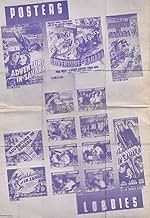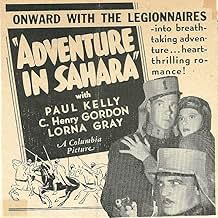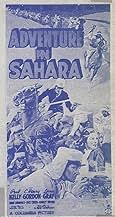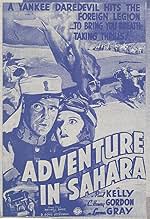Hobbled by low production values and a by-the-numbers story, "Adventure In Sahara" lives up to its generic title despite a game cast and some low-rent intensity.
Jim Wilson (Paul Kelly) is a pilot working for a French airline servicing North Africa when he gets a telegram informing him of his brother's death: "You Will Know Details." For Wilson, this means quitting his job and joining the Foreign Legion, where his brother served, requesting the same cruel commandant his brother had, Savatt (C. Henry Gordon). Jim plans on revenge.
"You can't fight Savatt without fighting the Legion," Wilson is told, the story's dilemma in a nutshell. Does Wilson dare take on the code of discipline that binds men at war in order to take out his personal vendetta on Savatt?
Kelly and Gordon deserve credit for doing what they can with underwritten parts. Gordon leaves a positively pungent impression as the hard-as-nails Savatt, dominating every scene he is in. It's no surprise to see he wears his medals to bed. A number of recognizable character actors of the period show up, including Al Bridge from Preston Sturges' stock company, Dwight Frye from "Dracula," and Marc Lawrence, longtime Hollywood tough guy who plays Wilson's closest buddy in the Legion. All do good work.
The problem is the dialogue, so on the nail it emphasizes at every turn the generic feeling of the flick.
"You understand the Legion is no playground..."
"Come, come, young one, this is the Legion..."
"I shall make Legionnaires out of you, or crush you in the attempt..."
Apparently the idea began in Samuel Fuller's head as a story about a group of Legionnaires who are given medals for bravery in combat, only to be executed for mutiny seconds later. By the time screenwriter Maxwell Shane took over, the film was working the usual "Beau Geste" angle of a cruel commandant with a "Mutiny On The Bounty" twist you see a mile away.
The influences are more obvious than are the characters' motivations. Why does Wilson think putting himself under Savatt's authority in such desolate circumstances is a good idea? Why does Savatt drive his soldiers to death when he is 700 miles behind enemy lines? Why does Wilson's girlfriend fly to Savatt's fort by her lonesome after he deserts her without explanation?
The production values are in line with this sort of quickie treatment: The cyclorama that passes for a desert sky has visible stains on it. The fort Savatt rules, Agadez, has no apparent dimension, just a gate, a parapet, and a few interior rooms. Like planktonrules notes, the Arabs who attack number little over a dozen unless they are shown in stock footage. I think I recognize the same bearded gent getting shot in three different scenes.
"Adventure In Sahara" is nonsensical at times, but never dull; in addition to the solid acting you get some mesmerizingly moody shots by director C. Ross Lederman, including a close-up of a sand-caked Savatt of which von Sternberg would have been proud. Lederman had an unremarkable career, but was a pro all the same and knew what he was after here. "Adventure In Sahara" is the sort of undemanding fare made to pass the time and be forgotten soon after.




































